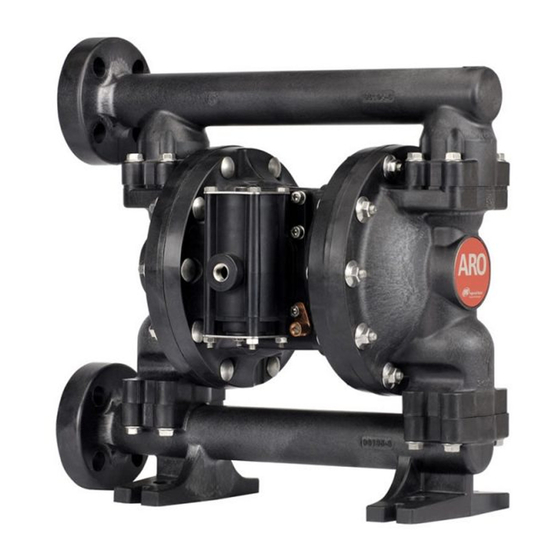ARO PD10E Series Instrukcja obsługi - Strona 2
Przeglądaj online lub pobierz pdf Instrukcja obsługi dla Pompa wodna ARO PD10E Series. ARO PD10E Series 8 stron. 1” diaphragm pump

READ, UNDERSTAND, AND FOLLOW THIS INFORMATION TO AVOID INJURY AND PROPERTY DAMAGE .
EXCESSIVE AIR PRESSURE
STATIC SPARK
EXCESSIVE AIR PRESSURE . Can cause per-
WARNING
sonal injury, pump damage or property damage .
Do not exceed the maximum inlet air pressure as
y
stated on the pump model plate .
Be sure material hoses and other components are able
y
to withstand fluid pressures developed by this pump .
Check all hoses for damage or wear . Be certain dispens-
ing device is clean and in proper working condition .
STATIC SPARK . Can cause explosion resulting in
WARNING
severe injury or death . Ground pump and pumping system .
Sparks can ignite flammable material and vapors .
y
The pumping system and object being sprayed must be
y
grounded when it is pumping, flushing, recirculating or
spraying flammable materials such as paints, solvents,
lacquers, etc . or used in a location where surrounding
atmosphere is conducive to spontaneous combustion .
Ground the dispensing valve or device, containers, hos-
es and any object to which material is being pumped .
Secure pump, connections and all contact points to
y
avoid vibration and generation of contact or static spark .
Consult local building codes and electrical codes for
y
specific grounding requirements .
After grounding, periodically verify continuity of
y
electrical path to ground . Test with an ohmmeter
from each component (e .g ., hoses, pump, clamps, con-
tainer, spray gun, etc .) to ground to ensure continuity .
Ohmmeter should show 0 .1 ohms or less .
Submerse the outlet hose end, dispensing valve or
y
device in the material being dispensed if possible .
(Avoid free streaming of material being dispensed .)
Use hoses incorporating a static wire .
y
Use proper ventilation .
y
Keep inflammables away from heat, open flames and
y
sparks .
Keep containers closed when not in use .
y
Pump exhaust may contain contaminants .
WARNING
Can cause severe injury . Pipe exhaust away from work
area and personnel .
In the event of a diaphragm rupture, material can be
y
forced out of the air exhaust muffler .
Pipe the exhaust to a safe remote location when
y
pumping hazardous or inflammable materials .
Use a grounded 3/8" minimum i .d . hose between the
y
pump and the muffler .
HAZARDOUS PRESSURE . Can result in
WARNING
serious injury or property damage . Do not service
or clean pump, hoses or dispensing valve while the
system is pressurized .
Disconnect air supply line and relieve pressure from
y
the system by opening dispensing valve or device and
/ or carefully and slowly loosening and removing out-
let hose or piping from pump .
HAZARDOUS MATERIALS . Can cause serious
WARNING
injury or property damage . Do not attempt to return
a pump to the factory or service center that contains
hazardous material . Safe handling practices must comply
with local and national laws and safety code requirements .
Page 2 of 8
OPERATING AND SAFETY PRECAUTIONS
HAZARDOUS MATERIALS
HAZARDOUS PRESSURE
Obtain Material Safety Data Sheets on all materials
y
from the supplier for proper handling instructions .
EXPLOSION HAZARD . Models contain-
WARNING
ing aluminum wetted parts cannot be used with III .-
Trichloroethane, Methylene Chloride or other Halo-
genated Hydrocarbon solvents which may react and
explode .
Check pump motor section, fluid caps, manifolds and
y
all wetted parts to assure compatibility before using
with solvents of this type .
MISAPPLICATION HAZARD . Do not use
WARNING
models containing aluminum wetted parts with food
products for human consumption . Plated parts can
contain trace amounts of lead .
Verify the chemical compatibility of the
CAUTION
pump wetted parts and the substance being pumped,
flushed or recirculated . Chemical compatibility may
change with temperature and concentration of the
chemical(s) within the substances being pumped,
flushed or circulated . For specific fluid compatibility,
consult the chemical manufacturer .
Maximum temperatures are based
CAUTION
on mechanical stress only . Certain chemicals will
significantly reduce maximum safe operating
temperature . Consult the chemical manufacturer for
chemical compatibility and temperature limits . Refer
to PUMP DATA on page 1 of this manual .
Be certain all operators of this equipment
CAUTION
have been trained for safe working practices,
understand it's limitations, and wear safety goggles /
equipment when required .
Do not use the pump for the structural
CAUTION
support of the piping system . Be certain the system
components are properly supported to prevent stress
on the pump parts .
Suction and discharge connections should be flexible
y
connections (such as hose), not rigid piped, and should
be compatible with the substance being pumped .
Prevent unnecessary damage to the
CAUTION
pump . Do not allow pump to operate when out of
material for long periods of time .
Disconnect air line from pump when system sits idle
y
for long periods of time .
Use only genuine ARO replacement parts to
CAUTION
assure compatible pressure rating and longest service life .
TO R Q U E A L L FA S T E N E R S B E F O R E
NOTICE
OPERATION . Creep of housing and gasket materials
may cause fasteners to loosen . Torque all fasteners to
ensure against fluid or air leakage .
= Hazards or unsafe practices which
WARNING
could result in severe personal injury,
death or substantial property damage .
= Hazards or unsafe practices which
CAUTION
could result in minor personal injury,
product or property damage .
= Important installation, operation or
NOTICE
maintenance information .
PD10E-X-X (en)
